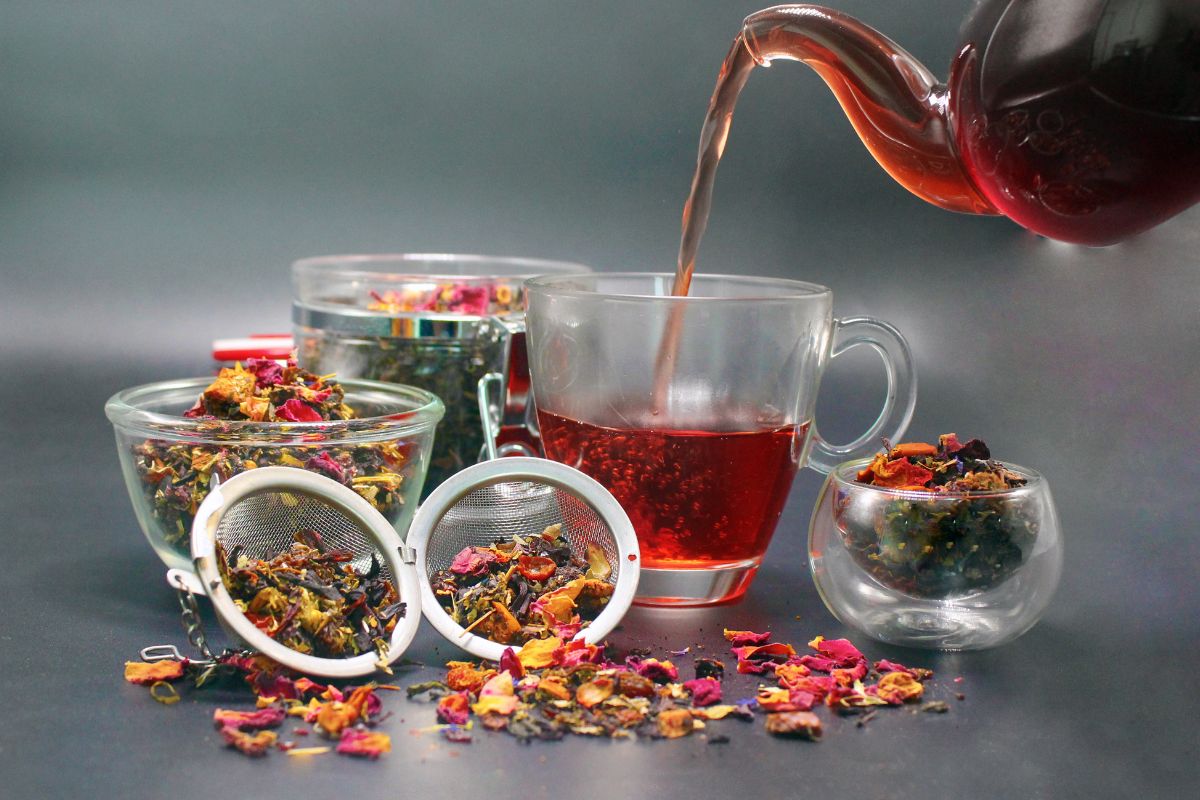Ah, tea! Is there anything more comforting than sipping a hot cup of tea after a long day? But what if I told you that this ritual can be more than just a moment of pleasure? Medicinal teas, made with natural herbs, have been used for centuries to treat everything from minor discomforts to more complex health issues. And the best part is: they are an accessible and natural way to take care of your body and mind without relying on medications or expensive treatments.
The use of plants for medicinal purposes is an ancient practice that spans cultures and generations. In ancient Greece, for example, the physician Hippocrates, considered the father of medicine, already recommended teas made from herbs like chamomile to treat various health problems. Over the years, the benefits of herbs have been proven by science, and today we know that the therapeutic properties of plants can help relieve pain, improve sleep, strengthen the immune system, and even combat stress.
So, if you’re looking for a natural way to improve your health and well-being, medicinal teas are an excellent option. But you may be wondering: how do I start? Which herbs should I choose? What’s the right way to prepare tea to reap all the benefits of each plant? Don’t worry! In this guide, we’ll help you understand everything you need to know to make your own medicinal tea and enjoy all the powers of herbs in a simple and practical way. Let’s go!
What Are Medicinal Teas and Why You Should Try Them
Medicinal teas are infusions made from plants, herbs, and flowers that have proven therapeutic properties. Unlike regular teas, which are often consumed just for their flavor, medicinal teas are used to treat, alleviate, or even prevent a range of health conditions. These teas offer a natural form of self-care, with the advantage of not needing chemicals or invasive treatments. They can be used for everything from minor issues like a cold to more complex problems such as anxiety and insomnia.
The plants that make up medicinal teas are rich in bioactive compounds that have specific effects on the human body. For example, chamomile is rich in flavonoids, which have a calming effect and help reduce anxiety, while ginger is known for its anti-inflammatory properties, helping to relieve pain and improve digestion. These compounds can directly affect the body, providing benefits that are often gentler and more natural than those from industrialized medications, yet just as effective.
In addition to their healing properties, consuming medicinal teas also provides a connection with nature. By preparing your tea with fresh or dried herbs, you are tapping into the power of plants in a simple, direct way. Through this process, you can slow down, create moments of introspection, and focus on self-care. It’s no wonder many cultures around the world, such as Chinese, Indian, and African traditions, have used teas as a wellness and healing practice for thousands of years.
So why should you start experimenting with medicinal teas right now? Well, teas are a practical, accessible, and delicious way to improve your health. They also offer a natural alternative to conventional medications, often without the unwanted side effects. Incorporating these teas into your routine can be a way to promote emotional and physical balance, improve sleep quality, strengthen your immune system, and even boost your energy in a healthy way. If you’re looking for something simple, effective, and natural, medicinal teas are undoubtedly a great choice.
Step-by-Step Guide to Making Medicinal Tea
Now that you know what medicinal teas are and why they’re so great, let’s get into the nitty-gritty of making your own tea. Here’s the complete guide for you to get started, with simple and no-fuss tips.
1. Choosing the Herb
The first thing you need to do is choose the herb or plant you want to use. This depends on the benefit you’re seeking. If you’re having trouble sleeping, chamomile might be a good choice. If you’re looking for something to aid digestion, mint is a great option.
Here are some popular choices to help you decide:
- Chamomile: For relaxation and insomnia.
- Ginger: For improving digestion and relieving nausea.
- Mint: To relieve stomach cramps and digestive issues.
- Fennel: To help with digestion and relieve intestinal discomfort.
2. The Right Amount of Herb
Once you’ve chosen your herb, the amount is important to ensure the tea is effective but not overwhelming. The general rule is to use about 1 teaspoon of herb for each cup of water. If you’re using fresh herbs, use a bit more—about 2 teaspoons. If you’re using dried herbs, the amount tends to be a little less.
3. Water Temperature
Here’s an important tip: water temperature is crucial for extracting the medicinal compounds from the herb. For delicate teas like chamomile, use water that’s not too hot (about 80°C), because higher temperatures can make the tea bitter. More robust herbs like ginger or mint can be made with boiling water (100°C).
4. Steeping Time
Now, the steeping time. Most medicinal teas need about 5 to 10 minutes to release all their benefits. For chamomile, for example, 5 minutes is enough for the tea to unleash its calming power. For ginger, it might need a little more time—up to 10 minutes—to ensure the active compounds are fully extracted.
5. Storage Tips
If you make more tea than you can drink at once, you can store it in the fridge for up to 2 days. Just be aware that the benefits may slightly decrease over time. The best option is always to prepare the amount you plan to consume right away.
Tips for Beginners
If you’re new to the world of medicinal teas, don’t worry! Here are some tips to help you ease into this herbal journey.
- Start with milder teas: If you’re unsure which herb to choose, begin with something mild, like chamomile or mint. These are easy to make and have a gentle effect on the body.
- Experiment with different combinations: Sometimes mixing herbs can result in an even more powerful infusion. How about mixing chamomile with fennel? Or mint with ginger? Don’t be afraid to explore!
- Avoid overdoing it: Like anything good, medicinal tea should be consumed in moderation. Don’t drink gallons of it each day, as some herbs can have side effects if taken in excess.
- Be patient: The effects of medicinal teas may not be immediate. Give your body time to adjust and let the tea work its magic. Don’t give up after one try!
Popular Medicinal Teas and Their Benefits
Now that you know how to make medicinal tea, let’s take a look at some of the most popular herbs and their benefits.
- Chamomile: Besides being incredibly tasty, chamomile is great for helping with sleep and reducing stress. If you’re having trouble falling asleep, it might become your new best friend.
- Ginger: Ginger is a powerful root with many benefits, such as improving digestion, relieving nausea, and reducing inflammation. It’s an excellent ally for anyone dealing with stomach issues.
- Mint: If you have digestive problems, mint will be one of your favorites. It helps relieve cramps and promotes healthy digestion.
- Lavender: For relieving stress and anxiety, lavender is one of the best options. Its calming aroma can also help improve sleep quality.
The Power of Medicinal Tea
Medicinal teas offer a simple and effective way to take care of yourself, using the best that nature has to offer. By integrating these infusions into your routine, you’re choosing a more natural and gentle way to promote balance in both body and mind. The benefits of these plants go far beyond simple remedies; they can become a daily wellness practice, providing moments of relaxation and introspection while treating or preventing various health issues. And the best part? These teas don’t require complicated equipment or expensive ingredients—just a good herb and a cup of hot water.
Furthermore, medicinal teas are a wonderful alternative to traditional medications, especially for those seeking a more holistic approach to health. While they don’t replace conventional treatments, many of these herbs have been studied and proven for their healing properties. Regularly consuming teas can help reduce dependence on medications for everyday issues like stress, insomnia, or digestive problems. Over time, you’ll notice improvements not only in your physical health but also in your emotional state, as many teas have a calming and restorative effect.
So, if you haven’t yet ventured into the world of medicinal infusions, now’s the time to take the first step. By starting to explore teas and their properties, you’re acquiring a powerful tool for your health that you can customize to fit your routine. And remember: medicinal tea is not just a drink, it’s an experience that engages the body, mind, and even the spirit. So, put the kettle on, pick your favorite herb, and start experimenting with the power of plants in a delicious and healthy way!
If you’re looking to dive deeper into the art of brewing medicinal tea, this article on Botanical Revival Herbs offers a comprehensive guide on various tea-making techniques. It covers everything from the basics of herbal infusion to more specialized methods like decoctions and long infusions. Whether you’re just starting or aiming to enhance your tea-brewing skills, you’ll find detailed information on how to extract the most benefits from your herbs. For more tips on brewing medicinal tea, check out the full article here.

Sam Bright is a passionate researcher of the power of medicinal plants and their benefits for health and well-being. With years of study and practice in the use of therapeutic herbs, he is dedicated to sharing accessible, evidence-based knowledge on how nature can support health holistically.
Through his blog, Sam explores everything from the traditional uses of plants to modern scientific discoveries, always with a practical and informative approach. His goal is to help people integrate herbal medicine into their daily lives in a safe and effective way.

